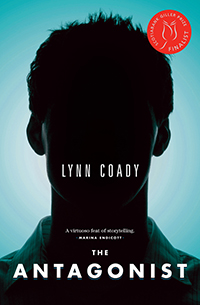Reviews
Fiction Review by Laurie D Graham
Lynn Coady, The Antagonist (Toronto: House of Anansi, 2011). Hardcover, 352 pp., $32.95.
In one crucial scene from Lynn Coady’s fourth novel, The Antagonist, our hero, Gordon “Rank” Rankin, Jr., a monolithic specimen attending university on a full hockey scholarship, tells his diminutive, bespectacled, totally incongruous friend Adam why he has just incinerated his ticket through university by walking out in the middle of a playoff game for refusing to fight. His team was about to face the third period of a match-up they couldn’t handle, and Coach was losing his mind, purple-faced and shrieking in the locker room with his eyes welded on Rank. What good is Rank’s nerve-racking stature, and what good is that full scholarship, if he’s not going to hospitalize anyone in the service of his team?
“Because I could kill a guy, Adam.”
Adam’s jaw actually drops. Rank can’t help but feel affection for him —he’s not like anybody else on the planet. He doesn’t possess the same frames of reference.
“Seriously?” says Adam.
“Yeah, seriously. Or give him brain damage. It’s a very easy thing to do.”
“But that’s unconscionable —that [Coach] would want you to do that.”
“Yes —thank you!” exclaims Rank. “But it’s like people don’t really believe in it. They think death is…like a dream. Like it’s something out of stories. They don’t realize it’s…always…right fucking there. Just hovering over everything we do.”
Rank’s words smack of past experience. But hockey isn’t central to Coady’s novel, even though the idea of the bruiser on skates is eerily prescient: this past summer we’ve seen the self-inflicted deaths of three NHL enforcers whose careers hinged on a readiness to pulverize the most talented and the most physically intimidating in equal measure. Rank is in league with the Boogards and the Belaks. He causes quivering in his fellow mortal and incites the repeated taunt of “gland case” while still a mere child. Interesting, though, that the only times we see him behave violently are when he’s coerced: he pummels punks under his dad’s orders at the Rankin ice cream shop; he bounces idiots from the local tavern/drug-front Goldfinger’s; he tries to fly to the aid of what he thinks is a beaten girl while he’s too drunk to know the difference.
Hop forward nearly two decades, and we encounter the present tense, epistolary conceit of the book, which takes the form of a string of emails Rank jettisons to his old friend Adam after coming across Adam’s recently published novel. Rank is now nearly forty and almost successful at reconciling the numerous dire turns his life to this point has taken, when he comes across a character in Adam’s novel with attributes too similar to a young Rank, with his occasional leaps into the realm of the dangerously bonkers, to be a coincidence. And it’s a character that is utterly flat, a menace, and a monster. So Rank rages. He threatens, he insults, and makes grave promises. It is a fearful thing to read, especially once you learn about the various edges on which Rank teeters, and when you come to know more about his father, the tiny, foul-mouthed Gord Rankin, Senior. Lynn Coady has spent much of her novelistic career writing about angry, violent, debilitated, fearful men who end up scarring their families but also love them with an ineptitude that’s only sweet from a great distance. And Gord, though an infuriating, weak little father figure, loves Rank in such wrong and sudden ways that you swing, as wildly as Rank does, from bemusement to frenzy. Coady, the Edmonton-dweller and Cape Breton native, is entering old-pro territory when it comes to irreverence (Heroclitus becomes “Captain Clit” in barely two moves!) and the impatient, unvarnished jumble of metaphors (fleeing from the bar into the night calls up Star Trek, then Star Wars, then bugs on a windshield, then Christmas lights ablaze, all quicker than you can turn to puke on your scungy old sneakers). She’s also honest-to-goodness proof that you can set entire works of fiction inside the Canadian border and still get nominated for hefty awards like the Giller. With The Antagonist, Coady also establishes a convincing disjunction between the things Rank says and how those things are perceived, between the fear he often illicits because of his visage and his own dumb ignorance of how he intimidates others. We grow unsure for a while of how aware he is that he’s stalking and threatening this old friend Adam, who, we hear through Rank’s emails, both proffers reconciliation and threatens legal action. We sigh with relief when the process of reclaiming his own story starts to set Rank sane, even though we suspect throughout that Adam has stopped reading Rank’s emails long ago, and we’re the only poor souls still paying attention.
—Laurie D. Graham









